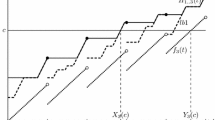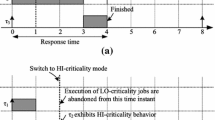Abstract
We consider sporadic tasks with static priorities and constrained deadlines to be executed upon a uniprocessor platform. Pseudo-polynomial time algorithms are known for computing worst-case response times for this task model. Some applications require to evaluate efficiently upper bounds of response times. For this purpose, we propose parametric algorithms that allow to make a tradeoff between quality of results and computational effort according to an input accuracy parameter. In this paper, we present a parametric polynomial-time algorithm for computing upper bounds of worst-case response times, that is based on an improved fptas (Fully Polynomial Time Approximation Scheme). Then, we show that our bound does not achieve constant error bound in comparison with the exact worst-case response time. However, using the resource augmentation technique, we obtain a performance guarantee that allows to define a compromise between our response-time bound and processor capacity requirements. The algorithm average behavior is then analyzed through numerical experimentations.
Similar content being viewed by others
References
Albers K, Slomka F (2004) An event stream driven approximation for the analysis of real-time systems. In: Proc Euromicro int conf on real-time systems (ECRTS’04), pp 187–195
Albers K, Slomka F (2005) Efficient feasibility analysis for real-time systems with edf scheduling. In: Proc of design, automation and test in Europe conference (Date’05), vol 1, pp 492–497
Audsley NC, Burns A, Richardson M, Tindell KW, Wellings AJ (1993) Applying new scheduling theory to static priority pre-emptive scheduling. Softw Eng J 8(5):284–292
Baruah S, Bini E, Nguyen T, Richard P (2007) Continuity and approximability of response time bounds. In: Euromicro conf on real-time systems (ECRTS’07), work-in progress
Bini E, Baruah S (2007) Efficient computation of response time bounds under fixed-priority scheduling. In: Proc int real-time and network systems (RTNS’07)
Bini E, Buttazzo G (2004) Schedulability analysis of periodic fixed priority systems. IEEE Trans Comput 53(11):1462–1473
Bini E, Buttazzo G (2005) Measuring the performance of schedulability tests. J Real-Time Syst 30(1–2):129–154
Bini E, Nguyen T, Richard P, Baruah S (2009) A response-time bounds in fixed-priority scheduling with arbitrary deadlines. IEEE Trans Comput 58(2):279–286
Chakraborty S, Kunzli S, Thiele L (2002) Approximate schedulability analysis. In: Proc int symposium on real-time systems (RTSS’02), pp 159–168
Davis RI, Burns A (2008) Response time upper bounds for fixed priority real-time system. In: Proc IEEE int symposium on real-time systems (RTSS’08), pp 407–418
Davis RI, Zabos A, Burns A (2008) Efficient exact schedulability tests for fixed priority real-time system. Proc IEEE Trans Comput 57(9):1261–1276
Eisenbrand F, Rothvoss T (2008) Static-priority real-time scheduling: response time computation is NP-hard. In: Proc IEEE int symposium on real-time systems (RTSS’08)
Fisher N, Baruah S (2005a) A fully polynomial-time approximation scheme for feasibility analysis in static-priority systems with arbitrary relative deadlines. In: Proc Euromicro int conf on real-time systems (ECRTS’05), pp 117–126
Fisher N, Baruah S (2005b) A polynomial-time approximation scheme for feasibility analysis in static-priority systems with bounded relative deadlines. In: Proc int conf on real-time and network systems (RTNS’05), pp 233–249
Fisher N, Nguyen T, Goossens J, Richard P (2007) Parametric polynomial-time algorithms for computing response-time bounds for static-priority tasks with release jitters. In: 13th IEEE international conference on embedded and real-time computing systems and applications (RTCSA’07)
Joseph M, Pandya P (1986) Finding response times in a real-time systems. Comput J 29(5):390–395
Lehoczky J (1990) Fixed priority scheduling of periodic tasks with arbitrary deadlines. In: Proc IEEE int real-time system symposium (RTSS’90), pp 201–209
Lehoczky J, Sha L, Ding Y (1989) The rate monotonic scheduling algorithm: exact characterization and average case behavior. In: Proc IEEE int real-time system symposium (RTSS’89), pp 166–171
Mäki-Turja J, Nolin M (2008) Efficient implementation of tight response-times for tasks with offsets. Real-Time Syst J 140(1):88–116
Manabee Y, Aoyagi S (1998) A feasible decision algorithm for rate monotonic and deadline monotonic scheduling. Real-Time Syst J 14(2):171–181
Masrur A, Drossier S, Farber G (2008) Improvements in polynomial-time feasibility testing for edf. In: Design, automation and test in Europe (DATE’2008), pp 1033–1038
Richard P, Goossens J (2006) Approximating response times for static-priority tasks with release jitters. In: WIP, Euromicro int conf on real-time systems (ECRTS’06)
Richard P, Goossens J, Fisher N (2007) Approximate feasibility analysis and response-time bounds of static-priority tasks with release jitters. In: Proc int real-time and network systems (RTNS’07)
Tindell K (1994) Fixed priority scheduling of hard real-time systems. PhD thesis, University of York
Author information
Authors and Affiliations
Corresponding author
Rights and permissions
About this article
Cite this article
Nguyen, T.H.C., Richard, P. & Bini, E. Approximation techniques for response-time analysis of static-priority tasks. Real-Time Syst 43, 147–176 (2009). https://doi.org/10.1007/s11241-009-9078-5
Received:
Accepted:
Published:
Issue Date:
DOI: https://doi.org/10.1007/s11241-009-9078-5




